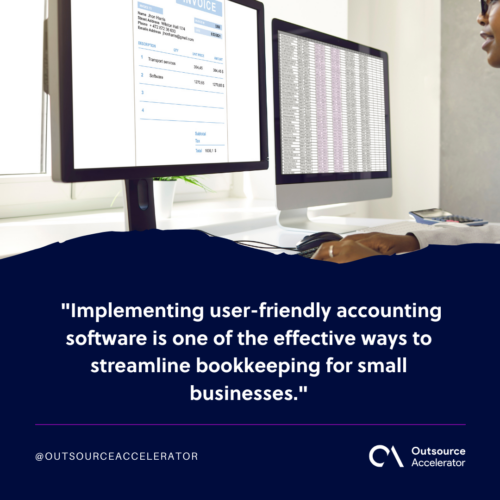Bookkeeping for small businesses: A complete guide

Bookkeeping is the bedrock of any business, particularly for Small and Medium-sized Enterprises (SMEs). It plays a vital role in ensuring financial stability and fostering regulatory compliance.
SMEs’ resources and margins can be tight. Meticulous bookkeeping guides the finance and accounting team to create an accurate insight into the company’s financial health.
This comprehensive guide will walk you through the importance of bookkeeping for small businesses and how to do it for your startup.
What is bookkeeping?
Bookkeeping is a systematic process that involves recording, classifying, and organizing all financial activities inside the company.
It ensures the precision and integrity of financial data, adhering to established accounting principles and tax regulations.
Moreover, bookkeeping acts as the fundamental infrastructure upon which a company’s financial health and stability are built.

Importance of bookkeeping for small business
Bookkeeping for small businesses helps startup entrepreneurs grasp a clear understanding of the financial landscape.
It accurately depicts cash flow, revenue, and expenses. These detailed records are also vital when seeking loans, attracting investors, or demonstrating financial credibility to potential partners.
Beyond enhancing financial transparency, bookkeeping is indispensable for tax compliance. It mitigates the risk of penalties or audits that could significantly impact the viability of a small business.
How to do bookkeeping for small businesses
Bookkeeping requires a systematic and meticulous approach to financial record-keeping.
Here are the following steps to start bookkeeping for your business:
Set up a system
For effective bookkeeping, begin by choosing a method for tracking transactions, ranging from manual entry in ledgers to using accounting software tailored for SMEs. Each transaction must be meticulously recorded, whether a sale, purchase, or expense.
Implement a filing system for receipts and invoices, ensuring they are stored securely and organized by date, category, or supplier.
This structured approach simplifies retrieving and verifying financial information when needed.
Track income and expenses
Precise recording of all income sources and outgoing expenses is fundamental in bookkeeping for small businesses. Every incoming revenue stream from sales, services, or investments must be meticulously logged.
Likewise, outgoing expenses such as operational costs, supplier payments, and overheads demand accurate documentation. Categorizing these transactions helps analyze spending patterns and identify profitable ventures where cost-cutting measures might be necessary.
Utilizing accounting categories or software features ensures a systematic approach, enabling clearer insights into the money flow within the business.
This granular view not only aids in understanding financial health but also serves as a basis for informed decision-making and future planning.
Maintain invoices and receipts
Organizing and safeguarding invoices and receipts is also essential in proper bookkeeping for small businesses. These documents are vital evidence of transactions and are indispensable during tax filing and preparation, audits, or dispute resolutions.
For this, you should Implement a thorough filing system, whether digital or physical, to categorize these documents by date, type, or vendor for ease of retrieval and reference.
Maintaining a comprehensive archive of invoices and receipts fosters transparency and trustworthiness, especially when dealing with stakeholders, investors, or regulatory bodies.
This practice streamlines the bookkeeping process and safeguards the business against potential discrepancies or disputes.
Regularly reconcile bank statements
Bank statement reconciliation is critical to robust bookkeeping for small businesses. Regular reconciliation highlights any discrepancies that might have occurred during the recording process.
Identifying and rectifying these errors promptly is pivotal to maintaining accurate financial data. It safeguards against potential issues like duplicate entries, missing transactions, or banking errors.
Track accounts payable and receivable
Tracking accounts payable (what your business owes to suppliers) and accounts receivable (what is owed to your business) is fundamental in bookkeeping for small businesses.
This practice involves maintaining updated records of outstanding payments owed to suppliers and the funds awaiting collection from customers or clients.
Conversely, monitoring accounts receivable facilitates the efficient collection of payments owed to the business, thereby optimizing cash flow.
Record depreciation and amortization
Accurate recording of depreciation and amortization is a crucial aspect of bookkeeping for small businesses with assets subject to these accounting principles.
Assets such as equipment, machinery, or intangibles often lose value over time (depreciation) or through usage (amortization). Recording these values is essential to reflect the true financial position of the business.
Failing to account for depreciation or amortization can misrepresent the company’s profitability and overall worth. Precise tracking of these values ensures that financial statements are accurate and the company’s financial records are transparent.
Prepare financial statements
The income statement in bookkeeping for small businesses itemizes revenues and expenses. This process also discloses profitability over a specific period. Meanwhile, the cash flow statement tracks cash inflows and outflows, elucidating liquidity.
Accurate preparation of these statements is fundamental to understanding the company’s economic health, securing financing, and demonstrating transparency to stakeholders.
Utilize accounting software
Implementing user-friendly accounting software is one of the effective ways to streamline bookkeeping for small businesses. These specialized tools cater to diverse business needs, automating processes and significantly minimizing errors.
Furthermore, these tools often integrate functionalities for invoicing, expense tracking, and bank reconciliation, simplifying day-to-day financial operations.

Consult a professional accountant
Seeking guidance from a professional accountant is also a smart move for small businesses. Sourcefit has created a new program for smaller businesses. Part of this is providing their clients with virtual assistants catering to their specific needs, such as bookkeeping.
Experienced accountants offer insights into optimizing tax strategies. Their expertise provides invaluable assistance, particularly for intricate financial matters, tax planning, or audits.
Start bookkeeping for your small business
Bookkeeping for small businesses must establish a trail of accurate financial records, which is crucial for securing loans or attracting potential investors.
This process also allows you to optimize cash flow, manage debts, and maintain healthy relationships with suppliers and clients.
By understanding bookkeeping basics, you can ensure accurate financial records, compliance with regulations, and informed decision-making.







 Independent
Independent




